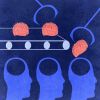-
 +20 +1
+20 +1Psychopathic men have an extreme focus on mating at the expense of other domains and tend be "parasitic" fathers
Why do psychopaths become parents? A study published in Evolutionary Psychological Science suggests that people high in psychopathy focus primarily on mating, but often avoid parental or somatic investment (meaning the growth and maintenance of oneself).
-
 +22 +1
+22 +1Good music makes us do bad things: The effect of music on compliance
People are more likely to agree to cause someone else harm when pleasant background music is playing, according to two new studies published in Psychology of Music. The studies challenge the common thinking that pleasant, familiar music is related to positive feelings and behavior, while unpleasant or aggressive music leads to the opposite.
-
 +14 +1
+14 +1Not Just Bliss: the Case for Ignorance
When is ignorance is more liberating than limiting? If you're Donald Rumsfeld, this statement is helpful for sending your country into an unwitting war. If you’re me, it’s useful for much, much more. I believe ignorance isn't only a weapon to be used in political battles, arguments, or to manipulate and control populations. Ignorance is a powerful tool, and it canbe wielded for good.
-
 +17 +1
+17 +1New research sheds light on attitudes towards police repression of protests
After the killing of George Floyd in May 2020, public protests (both peaceful and violent) became widespread and heavily covered in the media. The nation also saw increased discussion about the intervention and involvement of police at these protests. New research, published in Criminology, shows that support for the policing of protests is higher when the protest instills fear in the public and among those who feel threatened by changes to the racial status quo in America.
-
 +16 +1
+16 +1Face masks impair people's ability to accurately classify emotional expressions
New research suggests that masks can impact social functioning. The study, published in PLOS One, found that masks diminish people’s ability to accurately identify facial expressions. Face masks have been widely adopted in an effort to slow the spread of COVID-19, but little is known about the psychological consequences of this development.
-
 +8 +1
+8 +1We Read Emotions Based on How the Eye Sees
We use others’ eyes – whether they’re widened or narrowed – to infer emotional states, and the inferences we make align with the optical function of those expressions, according to new research published in Psychological Science, a journal of the Association for Psychological Science. The research reveals, for example, that people consistently associate narrowed eyes – which can enhance visual discrimination – with discrimination-related emotions including disgust and suspicion.
-
 +13 +1
+13 +1Family history of depression associated with altered brain connectivity during a social cognition task
A new neuroimaging study provides evidence that the neural mechanisms underlying social cognition are altered among those with a familial history of major depressive disorder. The findings have been published in the journal Depression & Anxiety.
-
 +4 +1
+4 +1Teens around the world are lonelier than a decade ago. The reason may be smartphones.
The largest increases occurred in Slavic, Baltic, English-speaking and Latin American countries.
-
 +4 +1
+4 +1Is There a Smarter Way to Think About Sexual Assault on Campus?
If I were asked by a survey to describe my experience with sexual assault in college, I would pinpoint two incidents, both of which occurred at or after parties in my freshman year. In the first case, the guy went after me with sniper accuracy, magnanimously giving me a drink he’d poured upstairs. In the second case, I’m sure the guy had no idea that he was doing something wrong.
-
 +20 +1
+20 +1New Stanford study says Zoom calls trigger our 'fight or flight' survival reflex
Does every meeting need to be a Zoom call? Americans are marking the one-year anniversary of stay-at-home orders and remote working with a growing sense of pandemic fatigue. And a new study finds that staring at your coworkers’ faces, up-close and personal, and your own is probably triggering your “fight or flight” survival reflex.
-
 +14 +1
+14 +1Teens who spend more time taking part in extracurricular activities like sports and art and less time in front of screens have better mental health, study finds
If you're worried about your kids' mental health, particularly because of the Covid-19 pandemic and social distancing mandates, less screen time and more extracurricular activities will help, says a new study. Adolescents -- especially girls -- who spend more time in extracurricular activities and less than two hours of screen time after school have better mental health, according to a study from the University of British Columbia and published in the journal Preventive Medicine.
-
 +10 +1
+10 +1Even if you want to, you can’t ignore how people look or sound
Your perceptions of someone you just met are influenced in part by what they look like and how they sound. But can you ignore how someone looks or how they sound if you’re told it is not relevant? Probably not, at least in most cases, a new Ohio State University study found.
-
 +15 +1
+15 +1Adolescents Are Kinder Than We Might Think
A researcher from the University of British Columbia in Okanagan is hoping to flip the switch on the pre-convinced stereotype that teens are mean. Associate Professor John-Tyler Binfet, a researcher in the School of Education, says teenagers often receive a negative reputation, sometimes showcased in mainstream media reports of bullying, cyberharassment or schoolyard battles.
-
 +4 +1
+4 +1Real Revolution Means Expanding Consciousness, Both Outwardly And Inwardly
The fight to liberate humanity from oppression, exploitation, butchery and madness is really a fight to expand consciousness.
-
 +17 +1
+17 +1Unpublished data from Stanley Milgram's experiments cast doubt on his claims about obedience
An analysis of previously unpublished data raises serious questions about Stanley Milgram’s landmark obedience experiments. The findings, which have been published in Social Psychology Quarterly, indicate that many people were willing to engage in seemingly reprehensible behavior because they saw through the researchers’ cover story. Those who believed the cover story, on the other hand, tended to be more defiant.
-
 +11 +1
+11 +1The Psychology of Russiagate
America in denial: Gabor Maté on the psychology of Russiagate. With Aaron Maté.
-
 +23 +1
+23 +1High score, low pay: why the gig economy loves gamification
Using ratings, competitions and bonuses to incentivise workers isn’t new – but as I found when I became a Lyft driver, the gig economy is taking it to another level. By Sarah Mason.
-
 +3 +1
+3 +1Sex Toys Will Never Be Able To Do The Hardest Work For You
In the years I worked at a sex shop, I saw how the pressure to have great sex — in a world that will never be a level playing field — can inflict its own kind of damage. By Fancy Feast.
-
 +11 +1
+11 +1The music moves us — but how?
The author of This Is Your Brain on Music talks about the very human ways the mind and body keep the beat.
-
 +14 +1
+14 +1The brainwashing myth
Once we move beyond brainwashing as an explanation for people’s behaviors, we can actually learn quite a bit about why individuals are drawn to new ideas and alternative religions or make choices at odds with their previous lifestyles. By Rebecca Moore.
Submit a link
Start a discussion




















